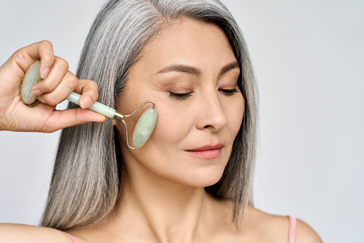Power of Green Vegetables and Herbs: Vitamins & Health Benefits You Need to Know
Posted by Mike Miryala on
Sam: The color that we are going to talk about today is Green which I think when people think about eating healthy is one of the more obvious colors. I think immediately people think about a salad. Many vegetables are green. So I'm gonna talk about some of the strong green vegetables and herbs that we can be incorporating into our diet and why it’s just so important.
So to start, the Green category is called Lutein, which is a naturally occurring antioxidant. So all green foods contain this component in each food. So the main benefit is protecting your eyes. So we've seen this also with orange. Orange was a lot of those vegetables and fruits - orange / yellow - they are meant to help with your eyes and so is green. This is super important because if our eyes aren't healthy, then you can't see, you know, you can't see things as well so you notice if you have to wear glasses. Those are signs that your eyes aren't getting this as much health as they need to.
So it contains folic acids which is important to prevent neural tube defects, which is important for people who are having children. It keeps your bones, your teeth, your nails super strong and It prevents blood clotting. And blood clotting is what then eventually leads to heart disease, heart attacks. So those are just some important benefits.
Now, I'm gonna give a few examples. I'll just list off some and then we'll go into more detail on a few of them. But thinking about green vegetables, the dark leafy greens category, that's been a pretty hot topic in the past few years. They've been getting a lot more attention and those can those are kale, spinach, collard greens, dandelion greens, just to name some of the main ones that people think about when you're in the grocery store. Those are what you're seeing always on the shelf and each of them have different beneficial components.
Kale is a very very strong dark leafy green and I know some people don't love kale. It's a tough one to love all the time, I would say. But there are ways to make it taste really good or also just to like hide it in your diet. So I'll just give you some ideas of ways to hide it is if you're having a smoothie it's super easy to just throw it in with the fruits and I'm telling you I do it for a lot of my clients and they have no idea that I put kale in. I don't tell them because I think that they would get this idea and then they might not want to eat it. But they love it. They're like the smoothies, their favorite thing that they have when I make it for them. So, that's just an easy way, like if you have kids, giving it to them with their smoothie. That's a great option.
Also, if you were to saute it down you can basically like make it become a lot smaller and then you could incorporate it in a dish like say Mac and Cheese. So then at least you're having more than just a grain and cheese, but you also are hiding in the greens in there. So those are just a few ideas. But I'm gonna start to talk a little bit about the benefits. So or I'm gonna keep listing a few first.
Sumeet: There are wide array of greens or green vegetable, right. You know, you brought up kale, then there is broccoli, then there are so many other greens. So are there differences in these Greens? Because some people like broccoli, some people like kale, some people like green pepper, green capsicums. So are there variation in benefits that you see out of these? Let's take an example of broccoli versus kale versus green pepper.
Sam: Right yeah, that's a great question. So overall, all these greens have overlap in what they're doing for you. So there is that piece if there are green vegetables that you prefer more, that's okay. Then you can lean into eating that because again going back to the idea of Eating The Rainbow. That's why it's eating each color is more important than eating a variety within the color spectrum that we're talking about, because the colors actually have a lot of overlap. So looking at some of the vitamins, vitamin C which we've talked about before is reoccurring in all of the whole rainbow. But vitamin C is very very potent in broccoli, in kale also. So when you're looking at that, it's similar.
There's also vitamin K you see a lot in the green category, which is linked to bone health and then you'll also see like a lot of fiber, a lot of iron in the green category. And so if you are wanting to focus on eating greens, focus on a few and you don't need to have them all. I think it's more important to think about which ones resonate with you the most and which ones are you most likely to want to eat in your day-to-day life, as opposed to just forcing yourself to eat these vegetables or fruits that like sound extremely unappealing because then you're not going to continue to do it. And that's my whole thing with all of my clients is I want these to be long-lasting habits that they develop over time as opposed to it being a quick fix, because a quick fix, it doesn't increase your longevity of life. It's just like a temporary thing and yes, it can make you feel good in the short term, but not necessarily the long term. So that's just something to keep in mind when you are just thinking about adding these fruits and vegetables into your diet. So yeah, there's that.
I would say so I'm gonna list a few more and then I'm gonna talk specifically about one that I think doesn't get a lot of credit and can be added to everything. So basically, some greens there we have cucumbers, those are packed with vitamin K. Those are basically just taste like water. You can have them as a simple snack. Cucumber and hummus is great. You can also toss them into all salads.
We have zucchini. Zucchini is in the same category as cucumbers, so they have a lot of the same vitamins and minerals like copper, vitamin A, vitamin C, vitamin B, vitamin K, like I said before. Avocado that serves more as a healthy fat and which not all the a lot of vegetables do, so that's like a little different. And then we have broccoli as we mentioned before. Brussels sprouts, bok choy, I don't know how much that's integrated in people's diets. It's more seen in the Asian culture, but that's super high in antioxidants and contains a lot of detoxifying properties, which is great for the body. I personally incorporate it when I have my clients go through detox. I have them have bok choy in multiple meals.
But the one that I really wanted to call out is broccoli sprouts or sprouts in general. I'm not sure how familiar people are with sprouts, but they basically are more compact versions of all these greens that exist. Sprouts come in a lot of different forms. There's like alfalfa sprouts. There's the broccoli sprouts and my favorite, they're also kind of sprouts / microgreens. They can go either way, my favorite are the broccoli sprouts because they are super super potent. It's like basically a more potent version of broccoli. They are just super high in nutrients, specifically Sulforaphane which you also see in kale and some other dark green vegetables as well. But sulfurafane is super super important for our bodies because it contains really potent anti-cancer properties and protects against inflammation.
I believe it's like a 10x, 10 times more you get in a small amount of having just sprouts versus just having an actual broccoli which is pretty cool because these sprouts, they're tiny you can sprinkle them on salads, you could literally sprinkle them on top of any dish. They don't have a strong flavor and it's just a really easy addition to increase the potency of the vitamins and minerals that you're intaking.
Sumeet: That is amazing because I'll tell you, I come from Indian culture and Indian culture sprouts plays a very important role. People have sprouts as snacks. They literally mix it with a little bit of onion, cilantro and have it with a little oil like olive oil, as snacks. But you're right, I mean this immense amount of focus on having sprouts and now I get it, you know. It delivers 10 times more benefit than the actual full-fledged vegetable. That’s outstanding.
Edward: I have a question for Sam because I actually love broccoli but I think with the majority of the people they tend to produce gas when you eat it. The sprouts that you're talking about, are they also prone to giving you gassiness or it's preferred because kind of that gets reduced?
Sam: Yeah, that's a great question! That does not occur because it's coming, it's in a different format and just in general anything that is sprouted is a lot easier for us to digest.
Edward: I see, thank you. But I have to consider that one because I love Cruciferous and problem with that is that you get a problem with that. Let's say.
Sam: Yeah a lot of people can't eat cruciferous vegetables like if you have IBS then you can't most likely because of the gas component. So yeah, but these anything like that sprouted, it's going through another fermentation. That's how you can think about it and then like things that are fermented are just so much easier for our body to digest.
Edward: Wonderful. Great explanation.
If you missed Samantha and Edward's discussion on Ozempic and Eat The Rainbow (Part 3 - Green), you can still watch the full episode here --> https://www.facebook.com/cobionic/videos/the-cobionic-talk-show/801701211600377





